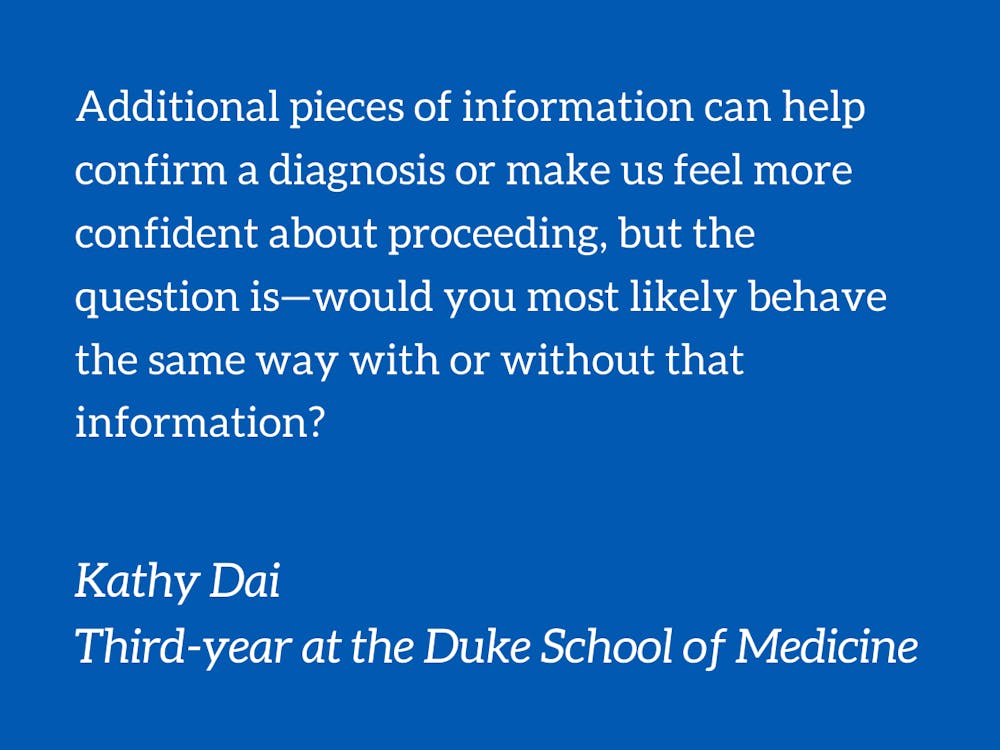In medicine, we are taught to consider whether additional testing—labs, imaging, input from specialists—will change what we ultimately decide to recommend a patient. Often, those additional pieces of information help confirm a diagnosis or make us feel more confident about proceeding, but the question is—would you most likely behave the same way with or without that information? If the answer is yes, then it’s likely an unnecessary step.
This thought process, summarized by the question “does it change management?”, has easily been one of my favorite lessons in medical school. It helps clinicians be more judicious about using limited resources (e.g., healthcare dollars, supplies, time) and helps reduce potential harm (e.g., radiation exposure, environmental waste, financial burden for patients). Even in my personal life, I find the heuristic useful in eliminating stress about things I can’t change or setting aside doubts that won’t impact what I end up doing—if it doesn’t change management, best not to worry about it.
Ultimately, the purpose of mental shortcuts that help us make better decisions is to maximize the good and minimize the bad. In our personal lives, this may mean gaining confidence in our choices and reducing stress. In economics, consumers are thought to want the highest utility—the usefulness or enjoyment derived from a good or service—for the lowest price. Similarly, in healthcare, we should aim to provide high-value care: the best patient outcomes at the lowest cost.

While heuristics like “does it change management” can improve the value of decisions that individual clinicians make on a daily basis, there are healthcare policy changes and private-sector innovations underway that have the potential to improve healthcare value on a larger scale.
The company ChenMed, for example, has managed to become one of the fastest growing companies in healthcare by taking care of Medicare Advantage patients. This group tends to include elderly, low-income patients with multiple chronic conditions and enormous healthcare costs, largely driven by frequent hospitalizations and visits to the emergency room—not an obvious consumer base for most for-profit healthcare systems or startups. Yet, ChenMed and others like it have been able to make a profit by assuming full financial risk for the cost of these patients’ care. They receive a set, “capitated” amount per patient and profit when patients do well enough (i.e., avoid enough hospitalizations, avoid developing complications or new conditions) to not cost the full amount.
These companies tend to feature innovative high-touch care models that involve frequent visits with primary care doctors (at least monthly), on-site mental health specialists, pharmacies, and coordinated referrals to specialists; some even offer transportation from patients’ homes to their doctor’s office. By being aggressive with preventative care and addressing known barriers (mental health, transportation, access to medications), they improve outcomes and reduce hospitalizations and costs, thereby achieving high-value care.
So, what do individual clinicians making decisions on the front lines of healthcare and certain for-profit, venture-backed healthcare companies have in common? The unifying goal is to provide patients with high-value care. It may even be uplifting to see companies able to turn a profit by taking exceptional care of the patients who need it most. Ultimately, it’s the job of the entire healthcare system—whether large academic institutions or private healthcare companies—and individual clinicians to ensure that the quality of life, experience with the healthcare system, and clinical outcomes of their patients outweigh the costs. As a future clinician, I’ll be asking myself “does it change management” daily. At the same time, I’ll support the health policy changes, research efforts, and even companies that align with the goal of improving outcomes and lowering costs in healthcare.
Kathy Dai is a third-year medical student at Duke University. Her column “Follow the Money” runs every third Friday.
Get The Chronicle straight to your inbox
Signup for our weekly newsletter. Cancel at any time.

